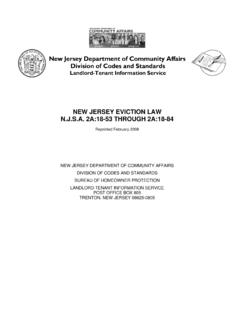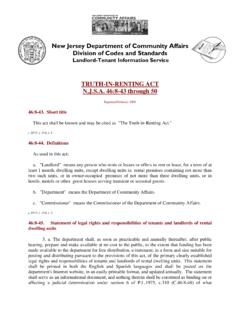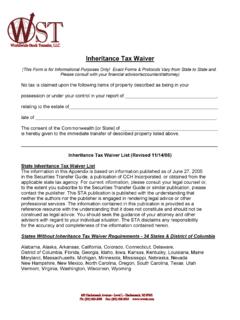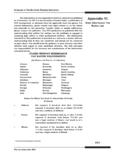Transcription of TOOLKIT FOR TENANTS LIVING IN FORECLOSED …
1 TOOLKIT FOR TENANTS LIVING IN FORECLOSED properties Department of the Public Advocate Division of Public Interest Advocacy 240 West State Street Trenton, NJ 08625 March 2010 1 TABLE OF CONTENTS INTRODUCTION .. 2 RIGHTS OF TENANTS LIVING IN FORECLOSED properties .. 3 General Laws .. 3 Laws for TENANTS in FORECLOSED properties .. 5 PROBLEMS TENANTS IN FORECLOSED properties FACE .. 6 Brief Overview of the Foreclosure Process .. 6 Attempts to Remove TENANTS in FORECLOSED properties .. 7 How to Deal with Attempts to Remove TENANTS .. 8 2 TOOLKIT FOR TENANTS LIVING IN FORECLOSED properties The New jersey Department of the Public Advocate Introduction As a result of the foreclosure crisis, tens of thousands of New jersey residential properties have been FORECLOSED , many of which are tenant occupied.
2 TENANTS LIVING in FORECLOSED properties may face a number of problems. These may be the result of actions by the landlord (before and after he loses the property to foreclosure), the new owner/landlord (the foreclosing lender or a third party), or people working for the owner/landlord (such as real estate agents, asset/property managers, and attorneys). Fortunately, New jersey law offers important protections for TENANTS LIVING in FORECLOSED properties . With very few exceptions, New jersey s TENANTS have the right to remain in their homes during and after a foreclosure, whether or not they have a written lease. The new owner takes the property with the TENANTS in it, and TENANTS cannot be removed simply because the property has changed hands.
3 TENANTS must receive written notices about their rights and responsibilities before and after the foreclosure. The new owner cannot harass or mislead TENANTS to get them to leave. And foreclosing lenders must maintain the property if the owner has abandoned it. This TOOLKIT is intended for TENANTS LIVING in FORECLOSED properties and those who assist them. It describes common problems that TENANTS may face and laws that may help address those problems. Laws mentioned can be found at libraries or on many free sources online. A companion guide for lawyers or other practitioners assisting these TENANTS , Resource Materials Regarding TENANTS in FORECLOSED properties (Supplement to TOOLKIT for TENANTS LIVING in FORECLOSED properties ), is also available.
4 THIS TOOLKIT IS FOR INFORMATIONAL PURPOSES ONLY AND DOES NOT CONSTITUTE LEGAL ADVICE. TENANTS SHOULD CONSULT AN ATTORNEY FOR LEGAL ADVICE. 3 RIGHTS OF TENANTS LIVING IN FORECLOSED properties This section has two parts: the first includes laws that apply to TENANTS whether or not they live in FORECLOSED properties and the second includes laws that apply to TENANTS in FORECLOSED properties . Most important for TENANTS to be aware of is that: TENANTS cannot be evicted or removed simply because the property where they live has been FORECLOSED . General Laws The laws included in this section can apply to TENANTS whether or not the property in which they live in is foreclosure. New jersey laws are protective of all TENANTS .
5 Legal Services of New jersey provides an overview of many of these laws: The Department of Community Affairs also publishes a manual with useful information, Truth in Renting ( ). Below are descriptions of the laws that the Public Advocate found useful in its work with TENANTS in FORECLOSED properties . Most TENANTS are protected by the Eviction for Just Cause Act, also known as the Anti-Eviction Act ( 2 to ). Under this law, owners are only allowed to evict TENANTS for one of the reasons or grounds stated in the statute. The law also requires landlords to provide TENANTS with notice of the reason for eviction before bringing them to court (only nonpayment of rent does not require notice).
6 The end of a lease is not one of the reasons for eviction. o TENANTS are not covered by the Eviction for Just Cause Act if the building they live in has three or fewer units and the owner lives in one of those units. In these cases, a landlord does not need to provide a reason or the notice required by the law. o TENANTS in FORECLOSED properties will be protected by the Eviction for Just Cause Act because a bank or other business is not considered to be an owner-occupant for purposes of this exception. (Aquino v. Pittari, 245 Super. 585 (1991); 3519-3513 Realty, LLC v. Law, 406 Super. 423 (2009)). TENANTS can only be evicted through a court process. This applies to all TENANTS , including those who are not covered by the Eviction for Just Cause Act.
7 Where a judge orders an eviction, only a court officer (for example, a sheriff s officer) with a warrant of removal signed by a judge can lawfully evict TENANTS . ( 2A: 39-1 and -2; 2A:18-57; 2 ; and related statutes). Self-help eviction by the owner or landlord is illegal. The State has made it a disorderly persons offense for any person, after having been warned by a public official, to attempt to evict a tenant in any way except through the courts. Owners are not allowed to threaten TENANTS , remove their personal property from their homes, lock them out, or shut off utilities in an effort to regain possession. TENANTS may call the police if the landlord or any other person enters the premises and attempts to evict them by these means.
8 The police then have a duty to assist the TENANTS in re-occupying their homes. ( 2 ). If a property changes hands, the new owner (not the old owner) is responsible for refunding the tenant s security deposit when the tenant leaves the property. Many 4 TENANTS are told that they have to get their security deposit from the old owner; this is not true. ( 46:8-20 and -21). At the end of a lease term (for example, a one-year lease), the landlord cannot evict a tenant covered under the Eviction for Just Cause Act except for one of the identified reasons. If the landlord and tenant do not sign another lease, the lease will continue on a month-to-month basis. ( 46:8-10). A tenant has some protections against utility (electric, gas, water, and wastewater) shut-offs by a private utility company when a landlord is responsible for paying the bills and fails to do so.
9 A utility company that is aware that TENANTS are LIVING in such a property must offer them continued service and bill them directly unless the utility can show that such billing is not feasible. The utility cannot require TENANTS to pay the past-due bill of any other person, including the landlord, in order to continue utility service. TENANTS may be charged only for service going forward. ( 14 ). While this regulation does not apply to municipally-owned utilities, municipalities should not turn off water at properties where TENANTS are LIVING , especially where the TENANTS are not responsible for paying the water bill. We have provided municipalities with water departments a memorandum of law explaining why they should not turn off the water.
10 TENANTS can use a portion of their rent money to continue utility service that is threatened to be shut off due to the landlord s failure to pay the utility bill. ( 2 (a) and Marini v. Ireland, 56 130 (1970)). TENANTS are protected by these laws whether or not they have a written lease. 5 Laws for TENANTS in FORECLOSED properties The New jersey Supreme Court has made clear that foreclosure alone is NOT grounds for eviction in New jersey . In Chase Manhattan Bank v. Josephson (135 209 (1994)), the Court stated that when a lender or other buyer takes a property through foreclosure, the residential TENANTS come with it. The new owner becomes the landlord and must abide by all the laws related to owning property.




